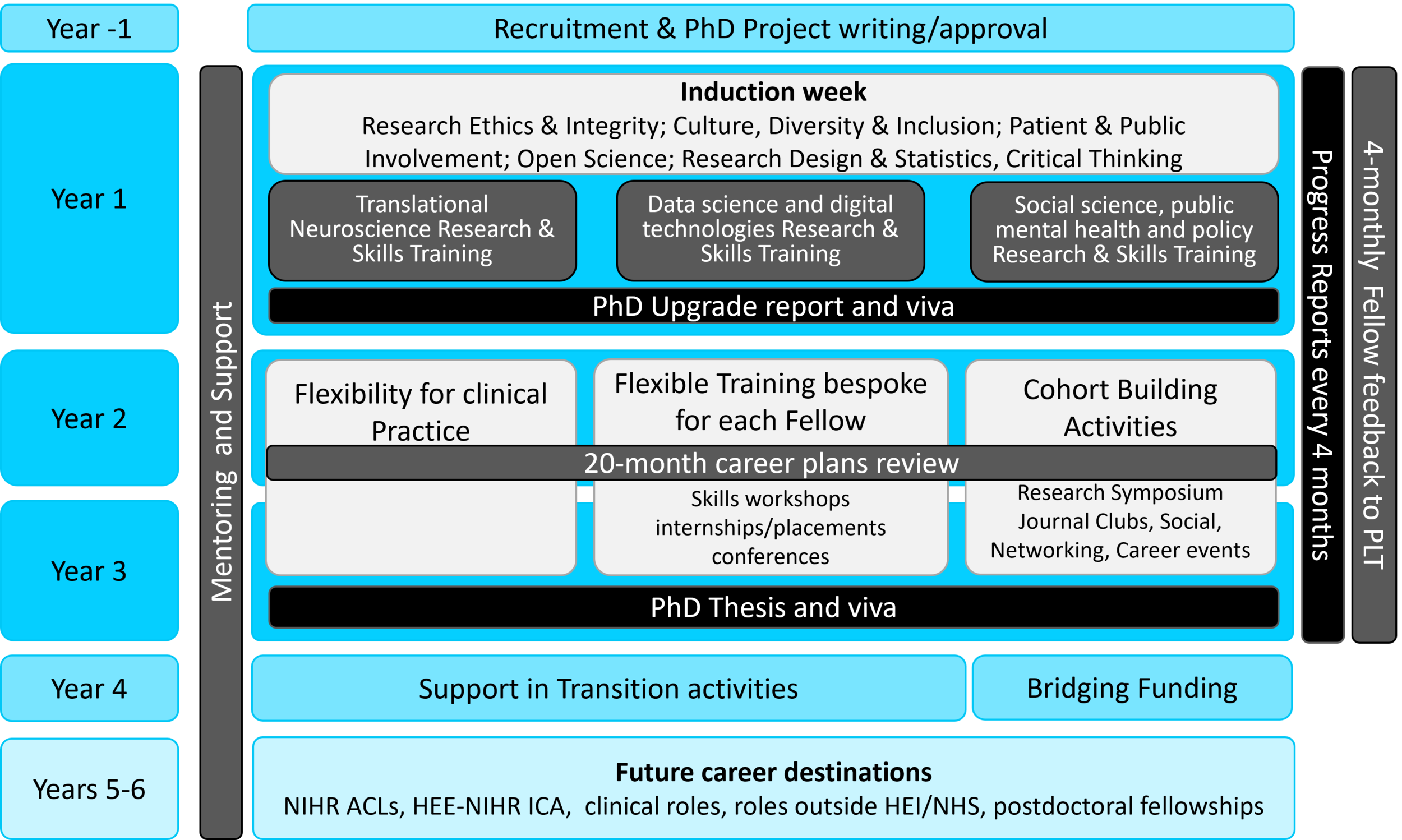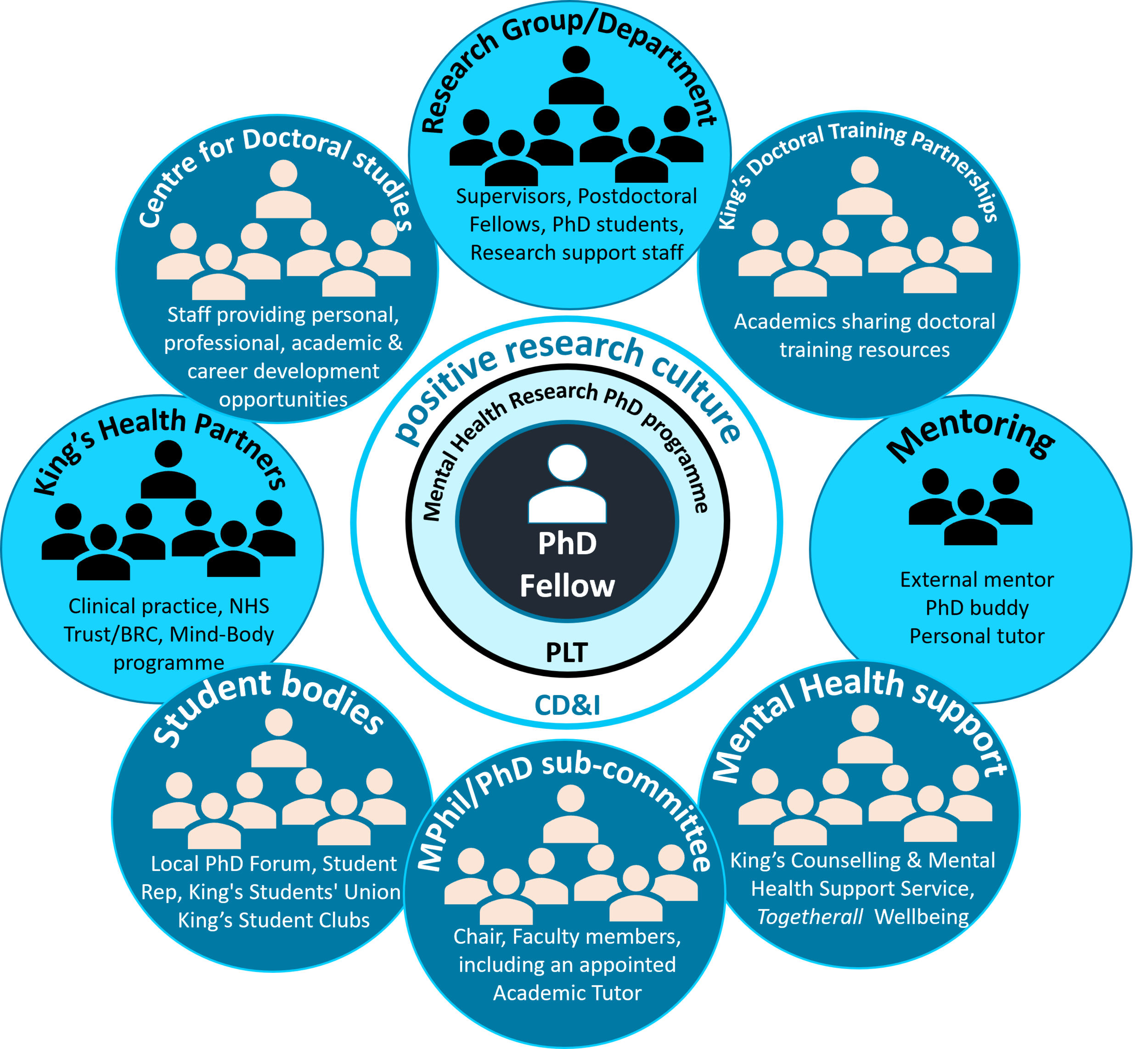Programme Structure
PhD fellowships available
Five PhD fellowships funded by Wellcome will be awarded each year for five years, with fellows starting between 2022/23 and 2026/27 academic years. In addition, at least two further PhD fellowships, funded by King’s College London, will be awarded over the life of the programme. PhD Fellows will be registered for their PhDs at King’s College London and usually also employed at King’s.
Year 1-3:
The structure of the training components of the programme is outlined in Figure 1. These include both cohort induction, training and networking days and bespoke, individualised training plans.
Induction will provide information on the expectations and processes of PhD progression. The in-house training platforms will be showcased, and PhD Fellows will attend interactive workshops on fundamentals of research design and research paradigms; ethics and governance; research integrity; principles of open and reproducible science; interdisciplinarity and why it matters; patient and public involvement; and practicalities of running a project.
PhD Fellows and their supervisors will identify individualised training needs at the outset, with periodic review. They will create a personal development plan with complementary research and leadership skills requirements.
Training opportunities include the King’s Clinical Academic Training Office (KCATO), along with the extensive programme of activities available through our Health Schools Doctoral Training Centre (HSDTC) in research methodology, communication and research impact, and career development training. This training is readily accessible on-line and in-person.
For specific skills there are further avenues. For example, social science theory and methodology training is provided through our ESRC LISS Doctoral Training Partnership (DTP). Our PhD-Fellows can engage with training in computation, either through our Centre for Doctoral Training in Data-Driven Health, or via our new “big data revolution skills training”, which offers less technically demanding informatics training. We run training in Patient & Public Involvement and Engagement (PPIE) through our Service User Research Enterprise (SURE). We will create bespoke training on open access and research integrity working with the King’s Research Integrity Office, and local members of the UK Reproducibility Network (UKRN). Training, advice and support in qualitative research methodologies is available through the Qualitative Applied Health Research Centre (QUAHRC). Where necessary, PhD-Fellows will be funded for external courses.
Our programme will include mandatory quarterly training days which will combine experiential small group learning with workshops.
All PhD programmes in King’s are subject to routine monitoring of progress (four-monthly) and PhD upgrade (year 1), which includes monitoring of training. The Programme Leadership Team (PLT) will have oversight and any concerns or barriers to training access will be addressed. Our programme will enhance this with four-monthly feedback opportunities to the PLT and a more formal 20-month review focused on future career plans.
Continued Career Support
PhD-Fellow welfare is of prime importance. In addition to optimising our research culture and supervisor-student relationships, as the diagram below outlines, we provide opportunities for peer to-peer support, mentorship and PhD-Fellow feedback (intervening when appropriate).
We will run a workshop for PhD-Fellows and our programme supervisors on mental health literacy (to help recognise personal mental health difficulties should they arise) and managing well-being through the PhD. King’s has a designated Student Mental Health Working group and a Student Mental Health and Wellbeing Strategic Plan. If problems arise for a PhD-Fellow, King’s has numerous support options available. Our Counselling Support Service caters to diverse psychological and emotional needs, including individual or group psychotherapy. King’s is a member of ‘Big White Wall’ a 24-hour confidential online support and wellbeing service. Many of the supervisors and PLT are clinicians, able to navigate referral to mental health services if needed.
Figure 2 describes the career support available throughout the PhD. There will also be support available from the King’s Clinical Academic Training Office which supports Health Professionals engaged in research at King’s.




